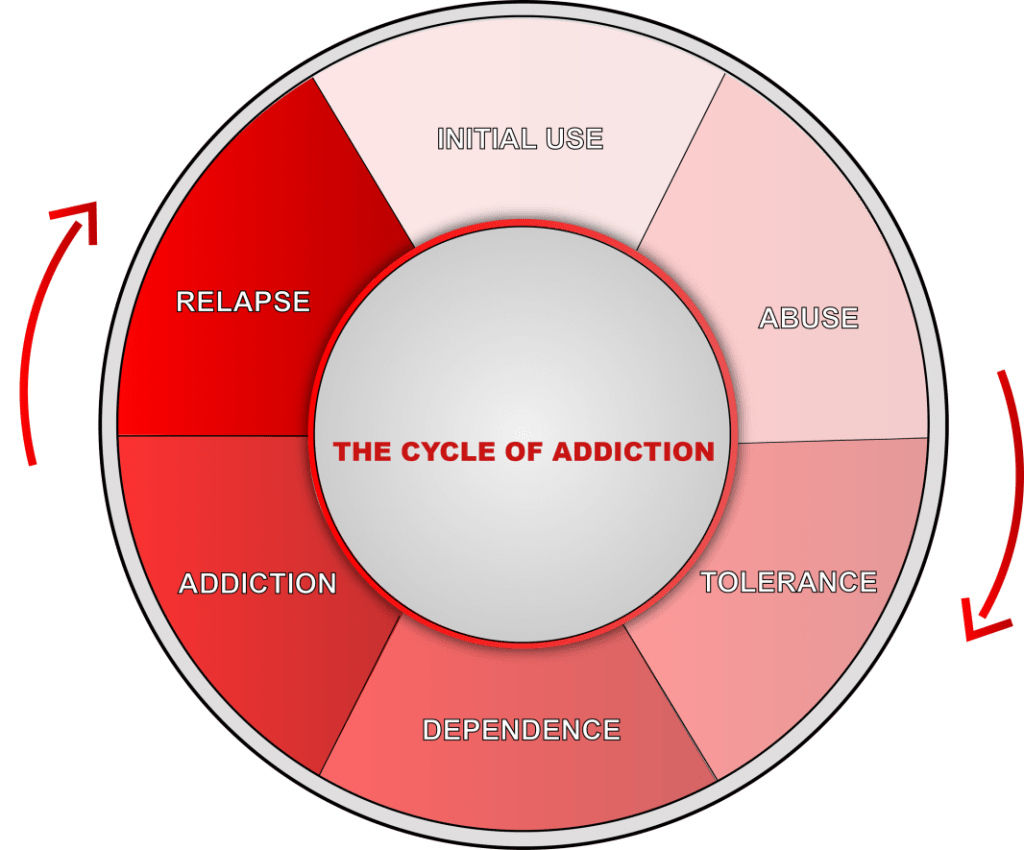成瘾过程(解说)

Table of contents
本文将讨论上瘾的心理过程,重点是上瘾背后的主要原因。
字典 "和 "口述 "也是由 "dictus "演变而来。
See_also: 肢体语言: 双臂交叉的含义因此,从词源学上讲,"瘾 "的意思是 "告诉、说或口述"。
许多瘾君子都清楚地知道,这正是毒瘾的作用--它告诉你该做什么;它向你发号施令;它控制你的行为。
See_also: 将陌生人误认为熟人上瘾与习惯不同。 虽然两者都是有意识地开始的,但在习惯中,人们会感到自己在某种程度上可以控制自己的习惯。 说到上瘾,人们会感到自己已经失去了控制,是别的东西在控制他。 他们无法控制自己,事情已经发展得太离谱了。
人们承认自己可以随时戒掉自己的嗜好并不困难,但当他们上瘾时,就另当别论了--他们觉得自己几乎无法控制自己的上瘾行为。
成瘾的原因
上瘾的基本机制与习惯相同,但两者并不相互排斥。 我们做的事情会让我们获得愉悦的奖励。 当我们做的次数足够多时,当遇到与奖励相关的触发因素时,我们就会开始渴求这种奖励。
这种触发因素可以是外部的(看着一瓶酒),也可以是内部的(想起上次被踢的情景)。
以下是人们沉迷于某些活动的常见原因:
1) 习惯失控
如前所述,上瘾本质上是一种失控的习惯。 与习惯不同,上瘾会让人对上瘾的物质或活动产生某种依赖。
例如,一个人最初尝试毒品可能是出于好奇,但他的大脑知道 "毒品能带来快感",每当它发现自己需要快感时,就会促使他再次吸毒。 不知不觉中,他就会对毒品产生强烈的依赖性。
我们所做的每一件事都会教给我们的心灵一些东西。 如果我们所做的事被我们的心灵记录为 "痛苦",那么它就会促使我们在未来避免这种行为;如果我们所做的事被我们的心灵记录为 "快乐",那么它就会促使我们在未来重复这种行为。
大脑寻求快乐和避免痛苦的动机(基于神经递质多巴胺的释放1)非常强大。 它通过激励我们的祖先追求性爱和食物,避免危险(多巴胺在不利情况下也会释放2),帮助他们生存下来。
因此,你最好不要教你的头脑去追求任何表面上可能会让你感到愉悦,但从长远来看却会让你变成奴隶的东西。
这个 TED 演讲解释了我们如何陷入这种快乐陷阱,以及如何从中恢复过来,是我见过的最好的演讲:
2) 我仍然没有找到我想要的东西
所有的瘾都不一定有害。 我们都有需求,我们所做的行为几乎都是为了满足这些需求。 我们的某些需求比其他需求更强烈。
因此,与其他与我们最强烈的需求无关或间接相关的行动相比,我们为满足自己最强烈的需求而采取的行动会受到强烈的驱动,而且会更加频繁。
任何过度行为的背后都有强烈的需求,这不仅适用于我们的基本生理需求,也适用于我们的心理需求。
沉迷于工作(工作狂)的人还没有达到与事业相关的所有目标。 沉迷于社交的人在某种程度上对自己的社交生活并不满意。
3) 回报的不确定性
我们之所以喜欢包装好的礼物,是因为我们不知道里面装的是什么。 我们会受到诱惑,想尽快撕开它们。 同样,人们沉迷于社交媒体的原因之一是,他们每次查看社交媒体时,都会期待得到奖励--一条信息、一个通知或一个有趣的帖子。
对奖赏类型和大小的不确定性,会强烈地促使我们重复导致奖赏的活动。
这就是为什么赌博(其行为特征类似于药物滥用3)等活动会让人上瘾,因为你永远不知道自己会有什么下场。
这也解释了为什么像扑克这样的纸牌游戏会让人上瘾。 你永远不知道随机洗牌会洗出什么样的牌,所以你会不停地玩,希望每次都能拿到好牌。
参考资料
- Esch, T., & Stefano, G. B. (2004).快乐、奖励过程、成瘾及其对健康影响的神经生物学。 神经内分泌学通讯 , 25 (4), 235-251.
- Robinson, T. E., & Berridge, K. C. (2000).成瘾的心理学和神经生物学:激励-敏感化观点。 成瘾 , 95 (8s2), 91-117.
- Blanco, C., Moreyra, P., Nunes, E. V., Saiz-Ruiz, J., & Ibanez, A. (2001 年 7 月). 病态赌博:成瘾还是强迫? 临床神经精神病学研讨会 (第 6 卷,第 3 期,第 167-176 页)。

